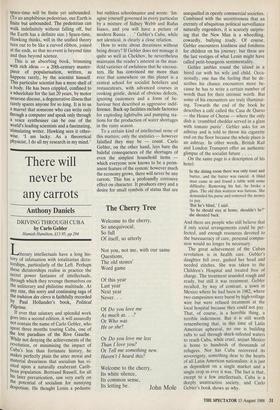There will
never be
any carrots
Anthony Daniels
DRIVING THROUGH CUBA by Carlo Gebler
Hamish Hamilton, f13.95, pp 294
•
Literary intellectuals have a long his- tory of infatuation with totalitarian dicta- torships, particularly of the Left. Perhaps these dictatorships realise in practice the secret power fantasies of intellectuals, through which they revenge themselves on the unliterary and philistine multitude. At any rate, this sorry and continuing saga of the train:son des clercs is faithfully recorded by Paul Hollander's book, Political Pilgrims.
If ever that salutary and splendid work goes into a second edition, it will assuredly not contain the name of Carlo Gebler, who spent three months touring Cuba, one of the lost paradises of the Rive Gauche. While not denying the achievements of the revolution, or minimising the impact of Cuba's less than fortunate history, he makes perfectly plain the utter moral and material dreariness that socialism has vi- sited upon a naturally exuberant Carib- bean population. Bertrand Russell, for all his later prevarication, saw very early on the potential of socialism for nannying despotism. He thought Lenin a pedantic but ruthless schoolmaster and wrote: 'Im- agine yourself governed in every particular by a mixture of Sidney Webb and Rufus Isaacs, and you will have a picture of modern Russia . . Gebler's Cuba, while not identical, is clearly a close relation.
How to write about dreariness without being dreary? If Gebler does not manage it quite so well as Chekhov, he nevertheless maintains the reader's interest in the man- ifold varieties of awfulness that he encoun- ters. He has convinced me more than ever that somewhere on this planet is a central school for socialist hoteliers and restaurateurs, with advanced courses in cooking gristle, denial of obvious defects, ignoring customers and a form of be- haviour best described as aggressive indif- ference. Back-up facilities include factories for exploding lightbulbs and pumping sta- tions for the production of water shortages in the rainy season.
To a certain kind of intellectual none of this matters; only the statistics — however falsified they may be — count. Carlo Gebler, on the other hand, lays bare the baleful consequences of the shortages of even the simplest household items which everyone now knows to be a perm- anent feature of the system: however much the economy grows, there will never be any carrots. This has a profoundly corrosive effect on character. It produces envy and a desire for small symbols of status that are unequalled in openly commercial societies. Combined with the secretiveness that an eternity of ubiquitous political surveillance naturally engenders, it is scarcely surpris- ing that the New Man is a wheedling, cowardly, bullying toady. Of course, Gebler encounters kindness and fondness for children on his journey: but these are the last vestiges of what Lenin might have called petit-bourgeois sentimentality.
Gebler ambles round the island in a hired car with his wife and child. Occa- sionally, one has the feeling that he de- scribes his chance encounters more be- cause he has to write a certain number of words than for their intrinsic worth. But some of his encounters are truly illuminat- ing. Towards the end of the book he describes a café called the Casa de Queso — the House of Cheese — where the only dish is 'crumbled cheddar served in a glass with tomato purée'. Gebler asks for an ashtray and is told to throw his cigarette end on the floor because the whole place is an ashtray. In other words, British Rail and London Transport offer an authentic glimpse of the socialist future . . . .
On the same page is a description of his hotel: In the dining room there was only toast and butter, and the butter was rancid. A blind man came in and found a table with some difficulty. Removing his hat, he broke a glass. The old thin waitress was furious. She demanded his purse and removed the money to pay.
`But he's blind,' I said.
`So he should stay at home, shouldn't he?' she shouted back.
And there are people who still believe that if only social arrangements could be per- fected, and enough resources devoted to the bureaucracy of care, personal compas- sion would no longer be necessary.
The great achievement of the Cuban revolution is in health care. Gebler's daughter fell over, gashed her head and needed stitches. She was taken to the Children's Hospital and treated free of charge. The treatment sounded rough and ready, but still it was treatment. Gebler recalled, by way of contrast, a town in Mexico where he had been in 1982, where two campesinos were burnt by high-voltage wire but were refused treatment at the local hospital because they could not pay. That, of course, is a horrible thing, a terrible indictment. But it is still worth remembering that, in this time of Latin American upheaval, no one is building rafts to sail through shark-infested waters to reach Cuba, while cruel, unjust Mexico is home to hundreds of thousands of refugees. Nor has Cuba recovered its sovereignty, something dear to the hearts of all Latin American nationalists: it is just as dependent on a single market and a single crop as ever it was. The fact is that, except to a few intellectuals, Cuba is a deeply unattractive society, and Carlo Gebler's book shows us why.






















































 Previous page
Previous page